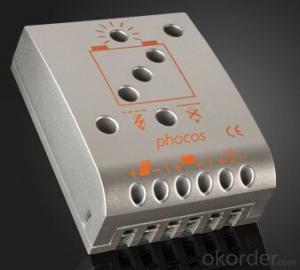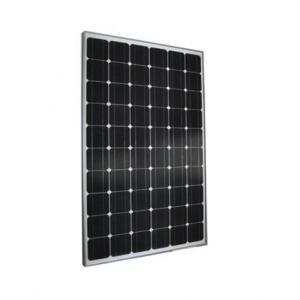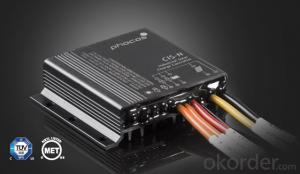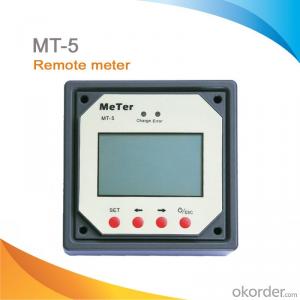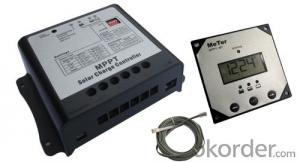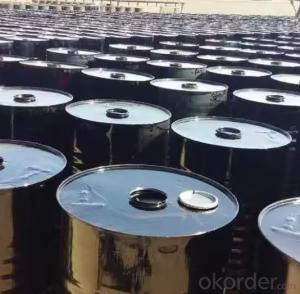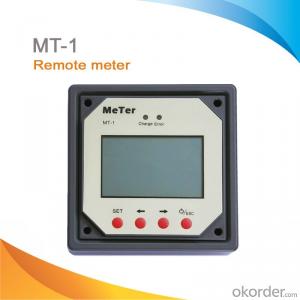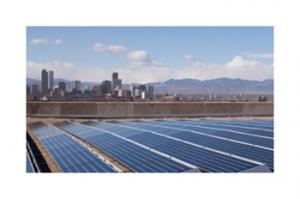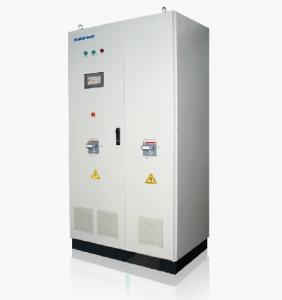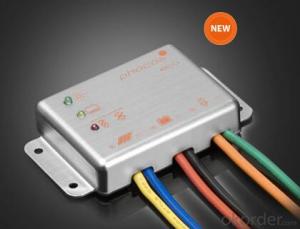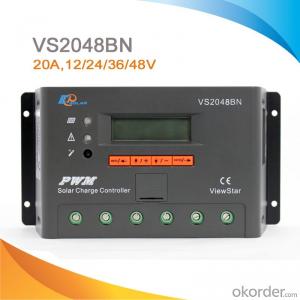CML Series (5 – 20 A) Solar Charge Controllers
- Loading Port:
- China Main Port
- Payment Terms:
- TT OR LC
- Min Order Qty:
- -
- Supply Capability:
- 10000 unit/month
OKorder Service Pledge
OKorder Financial Service
You Might Also Like
· Battery State-of-Charge display with 3 LEDs
· Acoustic load disconnect pre-warning
· PWM-regulation (series type)
· Boost, equalize and float charging, also for VRLA
· Automatic 12/24 V detection
· Integrated temperature compensation
· Large terminals (up to 16 mm2wire size)
· SOC and voltage controlled LVD
· Fully electronically protected
· The CML series is a sophisticated solar charge controller family for low cost applications. The electronic circuit is equipped with a microcontroller that provides high- efficiency charging technology together with a number of outstanding status display, warning and safety functions. The temperature-compensated three-stage PWM charging method (boost-equalization-float) is now adjustable tosealed and vented lead-acid batteries. The new version also allows an either SOC or voltage controlled low voltage disconnect function. The battery status is clearly indicated by three LEDs.
· As the first controller on the market in this price range it comes with an acoustic low voltage load disconnect pre- warning feature.
- Q:How does a solar controller prevent damage from reverse current flow?
- A solar controller prevents damage from reverse current flow by using diodes that allow current to flow only in one direction, blocking any reverse current and protecting the solar panel and battery from potential damage.
- Q:Can a solar controller be used with a solar-powered restaurant or cafe?
- Yes, a solar controller can be used with a solar-powered restaurant or cafe. A solar controller helps regulate and optimize the energy flow from the solar panels to the batteries, ensuring efficient and reliable power supply to the establishment. It also protects the batteries from overcharging or discharging, extending their lifespan. Overall, a solar controller is an essential component for managing the solar power system in a restaurant or cafe.
- Q:Can a solar controller be used with solar-powered water purification systems?
- Yes, a solar controller can be used with solar-powered water purification systems. A solar controller helps regulate the flow of electricity from the solar panels to the purification system, ensuring optimal performance and preventing damage to the system.
- Q:Can a solar controller be used with solar-powered weather monitoring stations?
- Yes, a solar controller can be used with solar-powered weather monitoring stations. A solar controller regulates the flow of energy from solar panels to the batteries, ensuring optimal charging and preventing overcharging. This is crucial in weather monitoring stations that rely on solar power as it helps maintain uninterrupted power supply and maximizes the efficiency of the system.
- Q:What is the compatibility of a solar controller with other components?
- The compatibility of a solar controller with other components refers to its ability to effectively work and communicate with other devices in a solar power system. It is crucial for a solar controller to be compatible with solar panels, batteries, inverters, and other system components to ensure optimal performance and seamless integration.
- Q:How does a solar controller handle variations in solar panel soiling?
- A solar controller does not directly handle variations in solar panel soiling. Its primary function is to regulate the charge and discharge of the battery connected to the solar panel system. However, it indirectly helps mitigate the effects of soiling by optimizing the performance of the solar panels. By monitoring the voltage and current produced by the panels, the controller ensures that the maximum power point tracking (MPPT) algorithm is employed, which adjusts the panel's operating conditions to extract the most power possible. This helps compensate for any losses caused by soiling and maintain the overall efficiency of the solar panel system.
- Q:Can a solar controller be used with solar panels of different technologies (e.g., monocrystalline, polycrystalline)?
- Yes, a solar controller can be used with solar panels of different technologies such as monocrystalline and polycrystalline. Solar controllers are designed to regulate the charging process and manage the power flow from the solar panels to the battery or load. They are compatible with various types of solar panels and can efficiently handle the different voltages and currents produced by different technologies.
- Q:Can a solar controller be used with solar-powered streetlights?
- Yes, a solar controller can be used with solar-powered streetlights. A solar controller regulates the charging and discharging of the solar battery, ensuring efficient power management. It helps to maintain the battery's health and prevent overcharging or discharging, thus extending the lifespan of the battery. Therefore, a solar controller is an essential component for the effective operation of solar-powered streetlights.
- Q:Can a solar controller be used with a solar hybrid system?
- Yes, a solar controller can be used with a solar hybrid system. A solar controller helps manage the flow of energy between the solar panels, battery bank, and the grid in a solar hybrid system, ensuring optimum performance and efficient utilization of solar energy.
- Q:Can a solar controller be used with solar-powered indoor heating systems?
- Yes, a solar controller can be used with solar-powered indoor heating systems. A solar controller is designed to regulate the flow of electricity from solar panels to batteries or other devices, ensuring that the system operates efficiently and effectively. In the context of solar-powered indoor heating systems, a solar controller can be used to regulate the flow of electricity from the solar panels to power the heating elements or other components of the system. It can help optimize energy usage, prevent overcharging of batteries, and ensure that the heating system operates at its maximum potential. Therefore, utilizing a solar controller with solar-powered indoor heating systems can enhance their performance and increase energy efficiency.
1. Manufacturer Overview |
|
|---|---|
| Location | |
| Year Established | |
| Annual Output Value | |
| Main Markets | |
| Company Certifications | |
2. Manufacturer Certificates |
|
|---|---|
| a) Certification Name | |
| Range | |
| Reference | |
| Validity Period | |
3. Manufacturer Capability |
|
|---|---|
| a)Trade Capacity | |
| Nearest Port | |
| Export Percentage | |
| No.of Employees in Trade Department | |
| Language Spoken: | |
| b)Factory Information | |
| Factory Size: | |
| No. of Production Lines | |
| Contract Manufacturing | |
| Product Price Range | |
Send your message to us
CML Series (5 – 20 A) Solar Charge Controllers
- Loading Port:
- China Main Port
- Payment Terms:
- TT OR LC
- Min Order Qty:
- -
- Supply Capability:
- 10000 unit/month
OKorder Service Pledge
OKorder Financial Service
Similar products
New products
Hot products
Hot Searches
Related keywords
